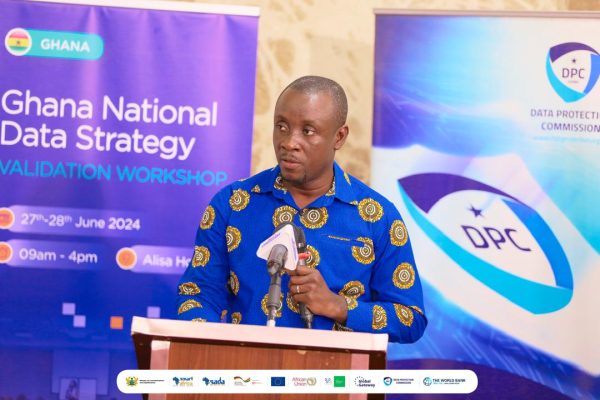The Ministry of Communications and Digitalization (MoCD), in conjunction with Smart Africa, today hosted a workshop to finalize Ghana’s National Data Strategy.
The workshop brought together professionals, government officials, and international partners to debate and agree on the strategy’s strategic goals and execution plans.
The Data Protection Commission is the event’s implementing agency on behalf of the MoCD, with support from the German Agency for International Cooperation (GIZ).
It emphasizes the necessity of data governance, technical infrastructure, and capacity creation. Participants came from many industries, ensuring a holistic approach to data management and digital transformation.
The goals and program for the day were presented by Mrs. Patricia Adusei-Poku, Executive Director of the Data Protection Commission (DPC).
She stressed how crucial it is that the plan be in line with Ghana’s medium- and long-term policy frameworks as well as the country’s long-term National Development Plan.
The session covered the conceptual framework, strategic objectives, and essential tasks required for the data strategy to be implemented successfully throughout the course of the day.
Highlights included talks about improving technical infrastructure, encouraging diversity in data usage, and modernizing the legal framework to keep up with technological changes.
Along with these topics, participants looked at building data centers, promoting cloud service usage, and enhancing data privacy and security.
Talla Ndiaye, the Data-Pop Alliance’s Director of the Digital Transformation Program, shared lessons learned from the experiences of other nations in creating data strategies.
He emphasized that driving digital transformation in Ghana requires a well-thought-out plan supported by strong data governance and technical assistance.
The realization that regulatory bodies must be empowered by cooperation was one of the workshop’s main outcomes. To ensure efficient data management, this involves establishing relationships between various sectors, revising regulations, and developing capability.
Practical incident reporting issues and the significance of fostering a compliance-friendly environment were also covered in the training. The regulatory authorities can improve cybersecurity and better protect data by creating systems that promote reporting and collaboration.
Finalizing a thorough and practical National Data Strategy was pledged to by the participants.
Utilizing the knowledge acquired, the Ministry of Communications and Digitalization and its partners hope to create a strategy that takes into account the priorities and requirements of Ghana’s data ecosystem.
The Minister of Communications and Digitalization will be present for the remainder of the workshop tomorrow. Directors and employees of the Ministry of Digital Benin (MoCD), Mr. Gaspard Datondji, the Deputy General Secretary of the Ministry, representatives from the National Communications Authority (NCA) and Cyber Security Agency (CSA), the Office of the Head of Civil Service, and representatives from other sectors were present.
BY: APPIANIMAA MERCY





